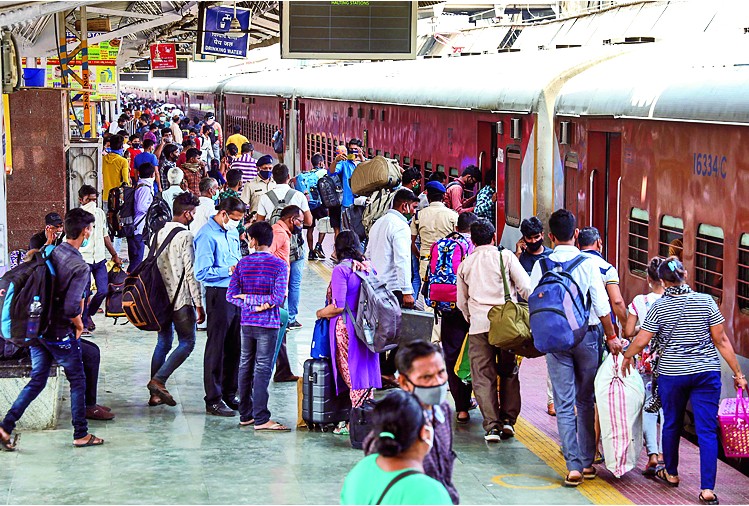Sir — At present, India is reportedly facing a crisis in animal nutrition. In particular, a shortage has cropped up in the availability of pet food. On an average, there is a demand for 30,000 tonnes of pet food in the country, but much of it remains unmet. There is scope for India to take this situation in its stride. Most pet owners cannot afford imported brands of pet food even though they want the best for their pets. With a little investment in this sector, the Indian pet food manufacturing industry could not only meet this demand but also contribute to boosting the country’s economy.
Ranjana Guha,
On the road

Migrant workers at Thane railway station to board outstation trains for their native place, amid the rise in Covid-19 cases across the country, in Thane, Thursday, April 15, 2021 PTI
Sir — With the steep spike in Covid-19 cases, the fear of another lockdown has sparked worries of another exodus of migrant workers from cities. Many have already started leaving for their native places. Calling for a war-like preparedness to deal with the surging number of Covid cases, several state governments have started imposing night curfews and weekend lockdowns, which have further increased the speculations about a complete lockdown.
The plight of migrant workers last year is not hidden from the world — everyone is aware that the sudden lockdown imposed by the Narendra Modi-led government led to a great human tragedy. Workers of the informal sector, which is widely recognized as the ‘backbone’ of the economy, were left stranded on the roads. With no arrangements for transport, they had to travel to their hometowns on foot.
A similar situation is arising once again. But the government does not seem to have learned from its earlier missteps. Deprived of even the basic amenities to survive, migrant workers are on the road again. The government still does not have a proper plan to solve these problems caused by the pandemic.
Sandeep Rawat,
Chandigarh
Sir — If there is one class of people that has been affected the most by the pandemic — during the lockdown last year and now again this year — it is the migrant workers. The previous lockdown — a national shutdown with only four hours’ notice — was a disaster for them as they were left stranded, with no livelihood or means to travel home. It was surely hunger that affected them more than the coronavirus.
The brief lockdowns recently imposed in Maharashtra, however, have been a little kinder to the migrant labourers, in the sense that they at least got the time to travel back home if they so wished. Migrant workers are mostly daily wage earners and it is difficult for them to survive in the absence of employment. The authorities must be more sympathetic to the migrant class. After all, they are the ones who keep the wheels of the economy turning in cities.
Melville X. D’Souza,
Mumbai
Sir — Amidst another exodus of migrant workers from cities, the finance minister, Nirmala Sitharaman, has reassured industries that there will be no complete lockdown this year. This is not surprising. Clearly, the Indian economy would not be able to survive another national lockdown. But rather than convincing heads of industries, the government should make an effort to reach out to the migrant labourers who are scared of a repeat of last year’s horrors.
In this regard, the Delhi government has set a good precedent. While announcing a week-long lockdown in Delhi, the chief minister, Arvind Kejriwal, has urged migrant workers to stay back. The Centre should follow suit. There should be clear communication between the two sections. If the workers wish to leave, arrangements should be made for their transport. For those who choose to stay, the government should take steps to convey to them that they are a valued part of the economy.
Shraddha Joshi,
New Delhi
Grave concern
Sir — The editorial, “Burning country” (April 19), rightly points out that India does not seem to have learnt any lessons from international precedents of wildfires. It is disturbing to learn that Uttarakhand has witnessed over a thousand incidents of forest fires in six months, and both human and animal lives have been lost.
Although forest fires can occur naturally, they are often caused by humans. Climate change has a role to play as well. Weak monsoons can lead to dry soil, making matters worse. Reports suggest that northeastern and central parts of India are most vulnerable to forest fires. But the recurrence of such fires does not seem to bother the government. Inadequate infrastructure and equipment still pose a challenge. Without the concerted efforts of the state governments and the Centre, it would be difficult to tackle the threats to biodiversity that forest fires pose. The government should ensure that help is sought from both international experts as well as local people in order to improve the situation.
Jayanta Datta,
Hooghly











